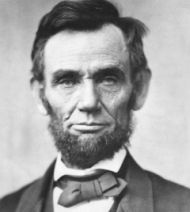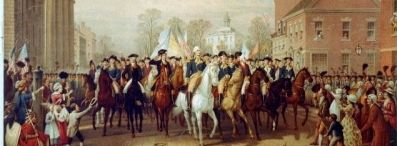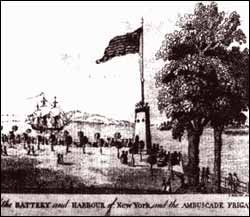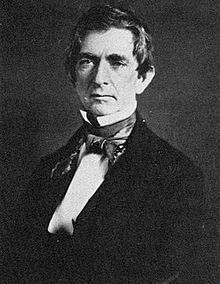
Publisher:
Bonnie King
CONTACT:
Newsroom@Salem-news.com
Advertising:
Adsales@Salem-news.com

~Truth~
~Justice~
~Peace~
TJP
Nov-24-2011 04:26

 TweetFollow @OregonNews
TweetFollow @OregonNews
Thanksgiving, Evacuation Day and Wall Street
Tim King Salem-News.comA little known U.S. holiday was replaced, more or less, by Thanksgiving, thanks to Abe Lincoln.
 'Evacuation Day' New York - Courtesy: blog.insidetheapple.net |
(SALEM) - Like most Americans, I understand the general concept of Thanksgiving, a holiday honored and celebrated every year in the U.S. and in other countries on their respective days.
 U.S. Pres. Abraham Lincoln |
The observation in the U.S. involves tribute toward Native American culture and people, and that amplifies its importance in my book.
What I did not always know, is that the observation owes its existence to a decision made by U.S. President Abraham Lincoln.
I also did not know that Thanksgiving more or less replaced a different holiday known as 'Evacuation Day' which marked the day the last British troops left New York in the wake of the Revolutionary War.
Very interesting.
To be clear, this is only one New England observation that shares the name Evacuation day, but it is the most significant as it involved the final departure of an enemy from the shores of a brand new country.
You can read about it in great detail on Wikipedia. Their summary indicates that the violence continued even as the defeated British sailed away.
The Trent AffairThe Trent Affair, also known as the Mason and Slidell Affair, was an international diplomatic incident that occurred during the American Civil War. On November 8, 1861, the USS San Jacinto, commanded by Union Captain Charles Wilkes, intercepted the British mail packet RMS Trent and removed, as contraband of war, two Confederate diplomats, James Mason and John Slidell. The envoys were bound for Great Britain and France to press the Confederacy’s case for diplomatic recognition by Europe. The initial reaction in the United States was to rally against Britain, threatening war; but President Abraham Lincoln and his top advisors did not want to risk war. In the Confederate States, the hope was that the incident would lead to a permanent rupture in Anglo-American relations and even diplomatic recognition by Britain of the Confederacy. Confederates realized their independence potentially depended on a war between Britain and the U.S. In Britain, the public expressed outrage at this violation of neutral rights and insult to their national honor. The British government demanded an apology and the release of the prisoners while it took steps to strengthen its military forces in Canada and the Atlantic. After several weeks of tension and loose talk of war, the crisis was resolved when the Lincoln administration released the envoys and disavowed Captain Wilkes's actions. No formal apology was issued. Mason and Slidell resumed their voyage to Britain but failed in their goal of achieving diplomatic recognition. Wikipedia page on Trent Affair |
| “ |
Following the American Revolution, Evacuation Day on November 25 marks the day in 1783 when the last vestige of British authority in the United States — its troops in New York — departed from Manhattan. The last shot of the American Revolutionary War was reported to be fired on this day, as a British gunner on one of the departing ships fired a cannon at jeering crowds gathered on the shore of Staten Island, at the mouth of New York Harbor (the shot fell well short of the shore) |
” |
Obviously bitter, the British forces refused to leave without giving the newly organized colonists something to think about. As the New York Website Inside the Apple explains, the British left at least one insult behind.
| “ | Someone had run a Union Jack up a flagpole, cut the halyard, and greased the pole so that when Washington arrived he’d still see the British colors flying over the city. It was up to a young sailor named John van Arsdale to rectify the situation. Using nails, he created cleats on the side of the flagpole and managed to carry a Stars-and-Stripes up to the top of the pole and replace the Union Jack before Washington’s arrival. (The somewhat fanciful depiction above is a later commemoration of the scene. Notice the fort directly behind the flagpole; that appears to be Castle Clinton in Battery Park, which wasn’t built until 1807 for service in the War of 1812.) - Inside the Apple page on Evacuation Day | ” |
 "Evacuation day" and Washington's triumphal entry in New |
Of course the British didn't completely pull out of the new United States, as Wikipedia explains, even after Evacuation Day, military forces from Great Britain remained stationed at 'frontier forts' located in areas defined by the 1783 Treaty of Paris. Under that arrangement, Britain continued to hold a presence in the old Northwest until 1815, at the end of the War of 1812.
Evacuation Day Practices
Americans weren't fond of the British after fighting for Independence and then again engaging the English Army and Navy in another war a few years later during which the British actually burned down the U.S. capitol.
As it turns out, the holiday celebration in the early years, culminated in an act of desecration against the flag of Great Britain. That continued at a place called Battery Park for roughly a hundred years following the departure of the British in 1783, as Wikipedia states.
 View of Battery Park 1793 -Wikipedia |
| “ | For over a century this event was commemorated annually with boys competing to tear down a Union Flag from a greased pole in Battery Park, as well as the anniversary in general being celebrated with much adult revelry and corresponding beverages. | ” |
While Thanksgiving would replace Evacuation Day as a national holiday celebrated coast to coast, the observation at Battery Park continued in smaller annual events until around 1900 or so. After World War One, the British and Americans were allies again, and the event lost even more popularity.
During the Civil War, Washington focused energy on Richmond, not London. While officially neutral, England maintained relations with the Confederacy during the U.S. Civil War, and nearly went to war with the United States over an international incident known as the Trent Affair (see sidebar above)
Then interestingly, after very little celebration in the 20th Century, Evacuation Day was again commemorated on 25 November 2008 with searchlight displays in New Jersey and New York at key high points.
Those searchlights were modern commemorations of bonfires that blazed during the Revolutionary War, as beacon signal systems, at many of these same locations, as Wikipedia explains.
| “ |
The seven New Jersey Revolutionary War sites: Beacon Hill in Summit, South Mountain Reservation in South Orange, Fort Nonsense in Morristown, Washington Rock in Green Brook, the Navesink Twin Lights, Princeton, and Ramapo Mountain State Forest near Oakland. Five New York locations contributed to the celebration: Bear Mountain State Park, Storm King State Park, Scenic Hudson's Spy Rock (Snake Hill) in New Windsor, Washington's Headquarters State Historic Site in Newburgh, Scenic Hudson's Mount Beacon. |
” |
Regarding the creation of the Thanksgiving Day Holiday by then U.S. President Abraham Lincoln, it is recorded that a woman who had been petitioning American presidents for 15 years, is who caught the interest of Lincoln, and led to his creation of the holiday in his October 3, 1863 declaration issued by William Seward:
Proclamation of Thanksgiving
Washington, D.C.October 3, 1863
This is the proclamation which set the precedent for America's national day of Thanksgiving. During his administration, President Lincoln issued many orders similar to this. For example, on November 28, 1861, he ordered government departments closed for a local day of thanksgiving.
Sarah Josepha Hale, a 74-year-old magazine editor, wrote a letter to Lincoln on September 28, 1863, urging him to have the "day of our annual Thanksgiving made a National and fixed Union Festival." She explained, "You may have observed that, for some years past, there has been an increasing interest felt in our land to have the Thanksgiving held on the same day, in all the States; it now needs National recognition and authoritive fixation, only, to become permanently, an American custom and institution."
Prior to this, each state scheduled its own Thanksgiving holiday at different times, mainly in New England and other Northern states. President Lincoln responded to Mrs. Hale's request immediately, unlike several of his predecessors, who ignored her petitions altogether. In her letter to Lincoln she mentioned that she had been advocating a national thanksgiving date for 15 years as the editor of Godey's Lady's Book.
The document below sets apart the last Thursday of November "as a day of Thanksgiving and Praise." According to an April 1, 1864, letter from John Nicolay, one of President Lincoln's secretaries, this document was written by Secretary of State William Seward, and the original was in his handwriting. On October 3, 1863, fellow Cabinet member Gideon Welles recorded in his diary how he complimented Seward on his work. A year later the manuscript was sold to benefit Union troops.
By the President of the United States of America.
A Proclamation.
The year that is drawing towards its close, has been filled with the blessings of fruitful fields and healthful skies. To these bounties, which are so constantly enjoyed that we are prone to forget the source from which they come, others have been added, which are of so extraordinary a nature, that they cannot fail to penetrate and soften even the heart which is habitually insensible to the ever watchful providence of Almighty God. In the midst of a civil war of unequaled magnitude and severity, which has sometimes seemed to foreign States to invite and to provoke their aggression, peace has been preserved with all nations, order has been maintained, the laws have been respected and obeyed, and harmony has prevailed everywhere except in the theatre of military conflict; while that theatre has been greatly contracted by the advancing armies and navies of the Union. Needful diversions of wealth and of strength from the fields of peaceful industry to the national defence, have not arrested the plough, the shuttle or the ship; the axe has enlarged the borders of our settlements, and the mines, as well of iron and coal as of the precious metals, have yielded even more abundantly than heretofore. Population has steadily increased, notwithstanding the waste that has been made in the camp, the siege and the battle-field; and the country, rejoicing in the consiousness of augmented strength and vigor, is permitted to expect continuance of years with large increase of freedom. No human counsel hath devised nor hath any mortal hand worked out these great things. They are the gracious gifts of the Most High God, who, while dealing with us in anger for our sins, hath nevertheless remembered mercy. It has seemed to me fit and proper that they should be solemnly, reverently and gratefully acknowledged as with one heart and one voice by the whole American People. I do therefore invite my fellow citizens in every part of the United States, and also those who are at sea and those who are sojourning in foreign lands, to set apart and observe the last Thursday of November next, as a day of Thanksgiving and Praise to our beneficent Father who dwelleth in the Heavens. And I recommend to them that while offering up the ascriptions justly due to Him for such singular deliverances and blessings, they do also, with humble penitence for our national perverseness and disobedience, commend to His tender care all those who have become widows, orphans, mourners or sufferers in the lamentable civil strife in which we are unavoidably engaged, and fervently implore the interposition of the Almighty Hand to heal the wounds of the nation and to restore it as soon as may be consistent with the Divine purposes to the full enjoyment of peace, harmony, tranquillity and Union.
In testimony whereof, I have hereunto set my hand and caused the Seal of the United States to be affixed.
Done at the City of Washington, this Third day of October, in the year of our Lord one thousand eight hundred and sixty-three, and of the Independence of the Unites States the Eighty-eighth.
By the President: Abraham Lincoln
William H. Seward,
Secretary of State
Source: Collected Works of Abraham Lincoln, edited by Roy P. Basler
Abraham Lincoln was far ahead of his time as an American; he was extremely liberal as was the Republican party at that time in U.S. history, and the anti-slavery movement was large and loud, even if the southern states which turned disloyal to the United States, could not appreciate the intensity of the abolitionists' intentions.
Abolitionists were diehard political radicals in many cases, who share a large number of traits with members of today's Occupy movement.
Washington's famous return to New York is depicted in the very spot where the current movement began, on Wall Street. They say history repeats itself when we forget its lessons, and once again that logic abounds.
_________________________________________________________Tim King: Salem-News.com Editor and Writer
Tim King has more than twenty years of experience on the west coast as a television news producer, photojournalist, reporter and assignment editor. In addition to his role as a war correspondent, this Los Angeles native serves as Salem-News.com's Executive News Editor. Tim spent the winter of 2006/07 covering the war in Afghanistan, and he was in Iraq over the summer of 2008, reporting from the war while embedded with both the U.S. Army and the Marines. Tim is a former U.S. Marine.
Tim holds awards for reporting, photography, writing and editing, including the Silver Spoke Award by the National Coalition of Motorcyclists (2011), Excellence in Journalism Award by the Oregon Confederation of Motorcycle Clubs (2010), Oregon AP Award for Spot News Photographer of the Year (2004), First-place Electronic Media Award in Spot News, Las Vegas, (1998), Oregon AP Cooperation Award (1991); and several others including the 2005 Red Cross Good Neighborhood Award for reporting. Tim has several years of experience in network affiliate news TV stations, having worked as a reporter and photographer at NBC, ABC and FOX stations in Arizona, Nevada and Oregon. Tim was a member of the National Press Photographer's Association for several years and is a current member of the Orange County Press Club.
Serving the community in very real terms, Salem-News.com is the nation's only truly independent high traffic news Website. As News Editor, Tim among other things, is responsible for publishing the original content of just under 100 Salem-News.com writers. He reminds viewers that emails are easily missed and urges those trying to reach him, to please send a second email if the first goes unanswered. You can write to Tim at this address: newsroom@salem-news.com
sss
Articles for November 23, 2011 | Articles for November 24, 2011 | Articles for November 25, 2011



Quick Links
DINING
Willamette UniversityGoudy Commons Cafe
Dine on the Queen
Willamette Queen Sternwheeler
MUST SEE SALEM
Oregon Capitol ToursCapitol History Gateway
Willamette River Ride
Willamette Queen Sternwheeler
Historic Home Tours:
Deepwood Museum
The Bush House
Gaiety Hollow Garden
AUCTIONS - APPRAISALS
Auction Masters & AppraisalsCONSTRUCTION SERVICES
Roofing and ContractingSheridan, Ore.
ONLINE SHOPPING
Special Occasion DressesAdvertise with Salem-News
Contact:AdSales@Salem-News.com


Terms of Service | Privacy Policy

All comments and messages are approved by people and self promotional links or unacceptable comments are denied.
Anonymous November 24, 2011 10:49 am (Pacific time)
There is much to be thankful today, and especially for those pilgrims that showed our future Founding Fathers just how important the free market system coupled with capitalism would make us the exceptional country that we became if their government design was as it is. These Founders were incredibly gifted. In late 1620, Pilgrims aboard the Mayflower reached the New World to found what would become Plymouth Colony. Governed by the Mayflower Compact—the representative government established through it—they thanked God for their safe voyage and disembarked the vessel with a cold winter before them. The winter of 1620-1621 was a brutal one for the Pilgrims. Almost half of the Pilgrims died from disease so that by winter’s end, there were just over 50 left to keep the colony viable. When the “first Thanksgiving” was celebrated after harvest time in November of 1621, the survivors were grateful for life and limb, and for the bare necessities that God and provided to keep them from perishing. Plymouth was an experiment, inasmuch as it was communal in its social structure. Although the Mayflower Compact had put a representative government in place, that government had been fashioned so as to recognize that everyone held everything within the colony in common. Therefore, this communal experiment, which lasted from 1621 to 1623, represented difficult years for the colony because it sucked the creativity and desire to prosper out of both the most gifted and physically fit Pilgrims. William Bradford wrote: In this instance, community of property…was found to breed much confusion and discontent, and retard much employment which would have been to the general benefit and comfort. For the young men who were most able and fit for service objected to being forced to spend their time and strength in working for other men’s wives and children, without any recompense. So while both of the first Thanksgivings—1621 and 1622—were gatherings at which the Pilgrims were simply happy to be alive, a strange thing happened on the way to the Thanksgiving in 1623. Namely, Gov. William Bradford saw fit to move the colony from the communal system of ownership to a system of private enterprise. According to Bradford: The failure of this experiment of communal service, which tried for several years, and by good and honest men proves the emptiness of the theory of Plato and other ancients, applauded by some of later times—that the taking away of private property, and the possession of it in community, by commonwealth, would make a state happy and flourishing; as if they were wiser than God. After Plymouth was privatized, with men owning land and making profits for themselves, Bradford wrote that they went from a scarcity of food of growing more corn than they could eat. In other words, they went from minimal food supplies to an abundance of the same. And when they gathered for Thanksgiving in 1623, they did so with the knowledge that God had blessed them beyond measure. Thus days of fasting and prayer marked portions of the Thanksgiving celebration of 1623. And it continued in this way until growing broader with President George Washington’s proclamation in 1789 and finally President Abraham Lincoln’s recognition of it as an official holiday in 1863. Washington’s proclamation is timely for us still: Whereas it is the duty of all nations to acknowledge the providence of Almighty God, to obey His will, to be grateful for His benefits, and humbly to implore His protection and favor. . . . Now, therefore, I do appoint Thursday, the 26th day of November 1789 . . . that we may all unite to render unto Him our sincere and humble thanks for His kind care and protection. So as we approach Thanksgiving, we must remember that we do so as a nation rich with history surrounding this holiday. And when we sit round our tables full of plenty, especially in these trying economic times, we ought to bow our heads and hearts to God as did colonial Americans and American statesmen gone before us. Truly, we are fortunate to live here, and not in some communist regime where our land is not our own. And surely we are blessed to have our daily bread…and some Turkey and dressing, too.
[Return to Top]©2026 Salem-News.com. All opinions expressed in this article are those of the author and do not necessarily reflect those of Salem-News.com.